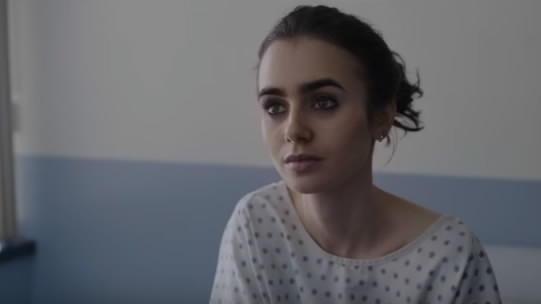
Culture & Sports
09:49, 19-Jul-2017
To The Bone: A survival story or glorification of anorexia?

To The Bone, released last week on Netflix, follows the story of a young girl, Ellen, as she battles anorexia and seeks recovery at a treatment center.
The movie, which was inspired by the experience of its director Marti Noxon with eating disorders, has been much discussed since the curtains were lifted on the trailer. It was praised for bringing a topic, often considered a taboo despite its prevalence, to public attention and raise awareness about young people's mental health.
But albeit starting with the good intention of opening a dialogue about eating disorders, To The Bone ended up with mixed reviews.

Screenshot of a scene from "To The Bone" trailer.
Screenshot of a scene from "To The Bone" trailer.
The film has been accused of "glamorizing" eating disorders.
Its focus on a frail and skeleton-like body, albeit being a somewhat true depiction of what people with anorexia suffer from, was criticized as it arguably adds to the pressure modern society and entertainment and fashion industries already place on female bodies and the "appeal" of thinness. Some held the opinion that the story could have been told without showing Ellen's shrunken stomach and spine, because, as counter-intuitive as it might seem, it could trigger relapse among those who have achieved recovery, and possibly inspire imitation in others.
Others, however, defended that disseminating realistic portrayals of anorexia is crucial to enable people's understanding of its nature and manifestations.
The criticism follows the same sulfuring rhetoric that was targeted at Netflix's previous drama "13 Reasons Why," which was blasted for "glorifying" teen suicide.

Lily Collins, the leading role of To The Bone. /VCG Photo
Lily Collins, the leading role of To The Bone. /VCG Photo
The film’s protagonist Lily Collins used to suffer from eating disorders, but the horrific memories did not stop her from shedding 10 kilograms before the shoot.
She said she felt it was important to play in the film because it was something she needed to go through for herself.
"It struck me as such an important subject matter to bring to the attention of people. It is still considered quite taboo to talk about, and yet it’s becoming more and more prevalent within today’s society, and not just with women. If not now, when?”

Screenshot of a comment on Netflix official 'To The Bone' trailer on YouTube.
Screenshot of a comment on Netflix official 'To The Bone' trailer on YouTube.
However, not everyone spoke against the movie.
Some pointed out that it is unfair to accuse the film of "glorifying" or "beautifying" anorexia, arguing that potential triggers are everywhere for people who are under the grip of eating disorders.
After the movie's release on July 14, the first batch of reviews said it was "simply good" and "sensitive but unsparingly real." Simultaneously, To the Bone was also praised as it put an "edgy" topic under the spotlight.
The movie neither offer a magic remedy to anorexia nor ensure that the protagonist finds her way away from the troubling situation she's enduring. But one thing is certain, trying precedes succeeding, and the faith in the eventual recovery drives the will to fight to get better. This is the truth the film illustrates to those who have been tormented by the eating disorder – that survival is possible.

SITEMAP
Copyright © 2018 CGTN. Beijing ICP prepared NO.16065310-3
Copyright © 2018 CGTN. Beijing ICP prepared NO.16065310-3